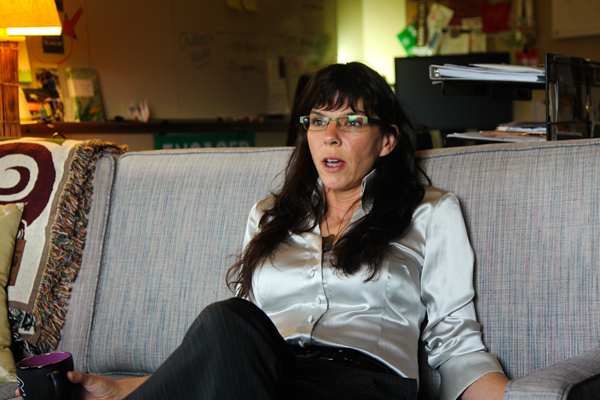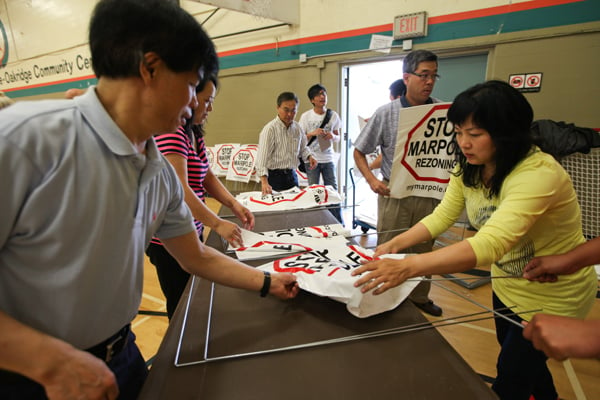It would be hard to find a politician who is more People's Republic of Commercial Drive than Vision Vancouver councillor Andrea Reimer.
She was shuttled around foster homes as a youth. Lived on nearby downtown Vancouver streets as a teenager. Dumpster dived. Did solidarity work in El Salvador. Became executive director of the Western Canada Wilderness Committee and managed several Vancouver Green Party campaigns.
Yet for all her left-activist history, you sensed that Reimer seemed somewhat leery as she stepped up onto the stage at Britannia Secondary off Commercial last week for an all-candidates debate -- and it wasn't because she uses a cane after a recent soccer injury.
When it was her time to speak, Reimer talked about her local roots and values. How she lives in the nearby Cedar Cottage neighbourhood. How her son went to a nearby daycare. How as a young single parent she organized "Moms On The Drive" to fight welfare cuts. How living as a renter (which she still is) inspired her to seek political office. She prefaced all this by acknowledging she was on unceded First Nations territory.
Then later Reimer addressed the elephant in the room -- the move by Vancouver's planning department earlier this year to place towers up to 36 storeys into the draft of the Grandview-Woodland community plan -- and how this happened at the eleventh hour of a lengthy consultation process in which towers had never previously been mentioned.
"We have said 'absolutely no' to towers at Broadway and Commercial," Reimer told the 80-member audience. "The first time we saw those (towers) was the same time that the community saw them."
The Vision council shelved the Broadway-Commercial towers concept and restarted the community plan process. But the episode has come to symbolize how Vision Vancouver's sometimes tone-deaf handling of development issues has alienated many former supporters in neighborhoods previously at the core of VisionLandia -- areas such as Grandview-Woodland, where voting turnout was high in the last election.
The big-tent liberal-left coalition which gave Mayor Gregor Robertson and Vision strong majorities in 2008 and 2011 is fractured -- or at least under severe stress. The electoral arithmetic which will determine whether Vision maintains its council majority -- and Gregor Robertson, his mayoralty -- hinges on how many former Vision voters shift to other parties such as the Vancouver Green Party and COPE, or even the conservative Non-Partisan Association (NPA).
Wealthy NPA and a divided left
The fragility of Vision's support base is probably one reason NPA president Peter Armstrong attended the Grandview-Woodland debate. Armstrong, CEO of the Rocky Mountaineer railway corporation that locked out its unionized workers for over a year, is extremely wealthy. Rich enough to have donated $470,000 both personally and through his companies to the NPA campaign. He may not live on Commercial Drive, but he knows that dissatisfaction in formerly solid Vision neighborhoods is the key to a payoff on his investment.
Sitting across the aisle from Armstrong at the debate was Jak King, a self-described anarchist and controversial community activist, who celebrated the birthday of anarchist heroine Emma Goldman last June on his blog. King is so upset at Vision, he's urging people to vote for the NPA's mayoral candidate Kirk LaPointe.
Just as Reimer tried to tell her Grandview-Woodland audience that her values are those of the activist community around Commercial Drive, so Vision Vancouver has used its opposition to Kinder Morgan and Chevron Oil funding in public schools to reclaim its affinity with progressives worried about climate change. And trumpeted its end-street-homelessness efforts to connect with those concerned with social justice.
The division on the left is worrying to those who believe the Vancouver Green Party and COPE are spoilers who will allow the centre-right NPA back into power. "It's what I call oppositional politics, which is that I am going to vote against Vision because I can find something inadequate," said former COPE councillor David Cadman who is backing Vision. "The question is: How much does the progressive side of the city bleed to candidates who can't win?"
These days Cadman is president of the International Council for Local Environmental Initiatives and meets frequently with left politicians elsewhere who are impressed with Vancouver's green success. "I'm travelling internationally and I hear: 'Oh, Rob Ford, what is wrong with your country?' Then what's nice is I'm with Annie Hidalgo, the Socialist [Party] mayor of Paris, and she is saying, 'give my best to Gregor.' He is known as a progressive politician."

Cadman lives in Grandview-Woodland and is optimistic that the new community plan process can produce a better result than a phalanx of towers around the Broadway-Commercial SkyTrain station -- "But it's not going to be no density, there is too much transit here for that to happen. So it's a matter of figuring out how to bring growth without transforming the neighborhood into Condolandia."
Cadman said that major development projects which alter the scale of a neighborhood, however slightly, are often politically tricky, even if they include major amenities, such as social housing. "It's complicated and unfortunately on the left side of the spectrum, you have people who say that if you vote for this project I will never support you again. It's defeatism in politics."
No more fallow fields for dense developments
The Vision council has been forced to grapple with how the city should accommodate the 150,000 new people (about 5,000 a year) expected to settle in Vancouver over the next three decades. Former NPA councillor Gordon Price said that earlier civic administrations were able to place new density on the industrial lands on the downtown peninsula and brownfield parcels elsewhere in the city.
But that option is no longer available so Vision is locating new growth on the edges of low-density neighborhoods, an approach that has given them election trouble.
"We (earlier NPA administrations) had the luxury of not having to deal with this in the '90s. We could put growth in the industrial lands," recalled Price, who is director of the city program at Simon Fraser University. "And our strategy was always that if we got pushed back, particularly by our base, as we did over tearing down apartment buildings in Kerrisdale, we took a step back.
"But Vision has not done that. And, in some cases, has handled it very badly. I still do not understand why they were not on top of that screw-up on Grandview-Woodland. It's a mystery to me.
"And it's not the only one. They have the bedside manner of (right-wing '60s era mayor) Tom Campbell, as I was told by someone who has been around long enough to compare. And I don't know why."
A prominent planning expert similarly said: "Grandview-Woodland will be interesting to watch. You take a steaming dump on a place where you got support. Didn't anybody take an electoral map with them? If you want a place of imagined Vision support, that was it."
Real estate sticker shock
Discontent on the left goes beyond Vision's willingness to consider towers -- and not just mid-rise buildings -- near transit lines. Many former Vision voters are upset that the centre-left party hasn't done enough to confront the housing affordability crisis, even though it's unclear what city hall could do given its very limited powers and the decisive impact of offshore money beyond council's control.
The federal government stopped funding social housing in 1994, and the province, under the BC Liberals, has concentrated on building it only for the hard-to-house. Vision has been forced to make density bonus deals with developers to try to get social or low-end market units built, but many of these projects have upset neighborhood groups.
Vision has acted to increase the supply of housing. But because prices remain high, many new rental or condo buildings are seen by many as contributing to the crisis rather than alleviating it. The paradox is that people who are normally concerned about the poor or the environment find themselves siding with million-dollar-home owners who oppose dense development in order to preserve a no-change single-family home aesthetic.
Social housing developments or new condo units that could provide homes to young middle-income people trying to get into the market suddenly become a threat to a neighborhood's scale -- to its character. "It's a paradox -- a paradox that's come back to bite Vision," said Price.
Vision's other problem is that new housing will always be at the higher end because it can't be seen as lowering property values, said Price. "And then you are into anxiety about change and you see that manifested in Grandview. But I know from my time on council that while that outrage may be very deep, and people can become obsessive about it, it can also be very narrow."
Towers as lightning rods
Among those for whom anti-Vision politics has become an obsession, or at least a going concern, is Chris Brayshaw, the owner of the much-loved used bookstore Pulp Fiction. Brayshaw has turned against Vision, which he previously supported, still angry that the Vision council has given conditional approval to a 21-storey condo tower being built by Rize Alliance near his bookstore at Broadway and Main Street in Mount Pleasant.
Brayshaw said that Vision had a lot of political capital to spend after its elections but squandered it. "Towers started sprouting like mushrooms after fall rain. A lot of neighborhoods that have agreed to work with Vision in good faith were surprised to find that what they had agreed to in those neighborhood plans were significantly different than was being considered."
(Doesn't matter that only 14 per cent of 35 development permit applications approved so far this year were for condo high-rises -- towers stand out and people who don't like them, they remember.)
Brayshaw said that Mount Pleasant residents didn't want the Independent, Rize Alliance's proposed residential tower at Main and Kingsway, but would have accepted the kind of mid-rise development that has occurred elsewhere in the neighborhood in recent years.
His objections represent a political challenge for Vision: many of its former backers are far more upset over the arrival of a tower with boring chain-store retail, or the loss of arts space or heritage houses than they are impressed with the city recently being named fourth in the annual Global Green Economy Index, behind Copenhagen, Amsterdam and Stockholm.
Or impressed with how Vision went against the development industry and the NPA -- and tried to restrain gentrification in the Downtown Eastside by preserving one small 12-block area for social and rental housing.
Brayshaw, who describes himself politically as a "Pierre Trudeau Liberal," is so angry that he signed the nomination papers of COPE mayoral candidate Meena Wong (who most would consider far to the left of Trudeau) and is backing the entire Vancouver Green Party slate, and the NPA's Elizabeth Ball. And Brayshaw is among the many -- on the left and right -- who use Twitter daily to vent their anti-Vision venom.
Greens oppose subway plan
While COPE's Wong can only be a spoiler abetting a LaPointe victory, Vancouver Green Party councillor Adriane Carr and her slate are real threats to Vision's majority on council. A survey by pollster Barb Justason earlier in the campaign found Carr was the top choice for council. "You have no idea how my heart filled with joy," Carr told The Tyee, prior to speaking at the Grandview-Woodland debate, about her hope that the Vancouver Green Party can hold the balance of power in the new council. "It was very gratifying, it was humbling."
It was less than gratifying for Vision, though the party now believes Carr no longer leads the council pack but will probably win re-election because of name recognition.
SFU's Price said that Carr has deliberately aligned herself with neighborhood groups upset over city policy. "Her strategy has been to basically oppose anything that has any blowback when it comes to development, I mean pretty universally. She does it on the basis that the consultation process is flawed, or the thing is over-scale, or not affordable enough. She's got one reason or another."
Carr voted to support the goals but not the implementation policies of the city's Transportation 2040, which aims to have two-thirds of trips in Vancouver being made on foot, bike or transit by 2040. Carr wouldn't support the plan's strategy because she opposes the Broadway subway proposal.
Vision has argued that the Broadway subway is the most environmental project the city can undertake because it would remove tens of thousands of car trips from the road every day -- and is critical to the city's greenhouse gas reduction goals.
Carr has argued that the $2-billion cost of the underground line from VCC-Clark Station to Arbutus would force the city to allow massive development along Broadway so that it can extract fees to fund the rest of the line to UBC.
Vision wooing would-be vote-splitters
In the end, people who vote Green are unlikely to do so because they watched Carr in action at council on a streaming video. Many voters are simply comfortable with the Green brand.
SFU's Price said the Green brand gives that party an advantage over COPE, which has shifted further and further to the left. "The Greens are better-positioned because they will get the second votes of many people who will vote Vision or NPA. I just saw (Green candidate) Pete Fry a few hours ago. I fully expect he will soon be councillor Fry, but we'll see." Fry should do well in Grandview-Woodland, which is next door to his home base of Strathcona, where he headed the residents association.
Reimer and other Vision councillors will be hoping that the party's left roots still have appeal in East Vancouver despite the fiasco of the community planning process.
"I think there will be some splitting of voting," said Vicki Scully, a director of the Grandview-Woodland Area Council, about which way her neighbourhood will vote. "There has been a mellowing of enthusiasm for Vision.
"But I think there is still a good values alignment here with many of the things Vision has done and will do. And I hope that Vision has learned through the community dialogue -- because it's been a painful couple of years." ![]()
Read more: Municipal Politics

















Tyee Commenting Guidelines
Comments that violate guidelines risk being deleted, and violations may result in a temporary or permanent user ban. Maintain the spirit of good conversation to stay in the discussion.
*Please note The Tyee is not a forum for spreading misinformation about COVID-19, denying its existence or minimizing its risk to public health.
Do:
Do not: